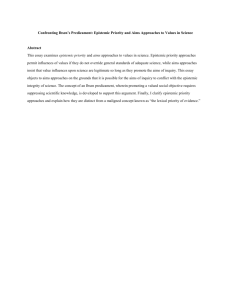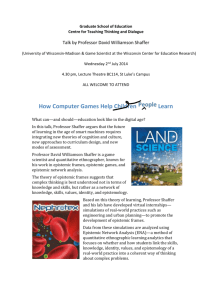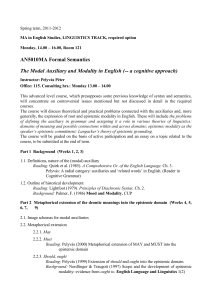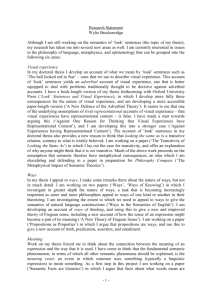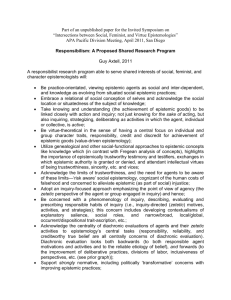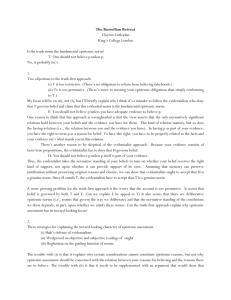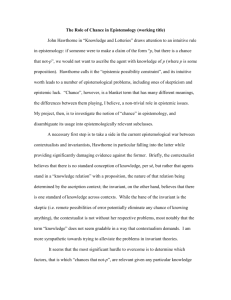A Virtue Approach to Epistemic Angst
advertisement
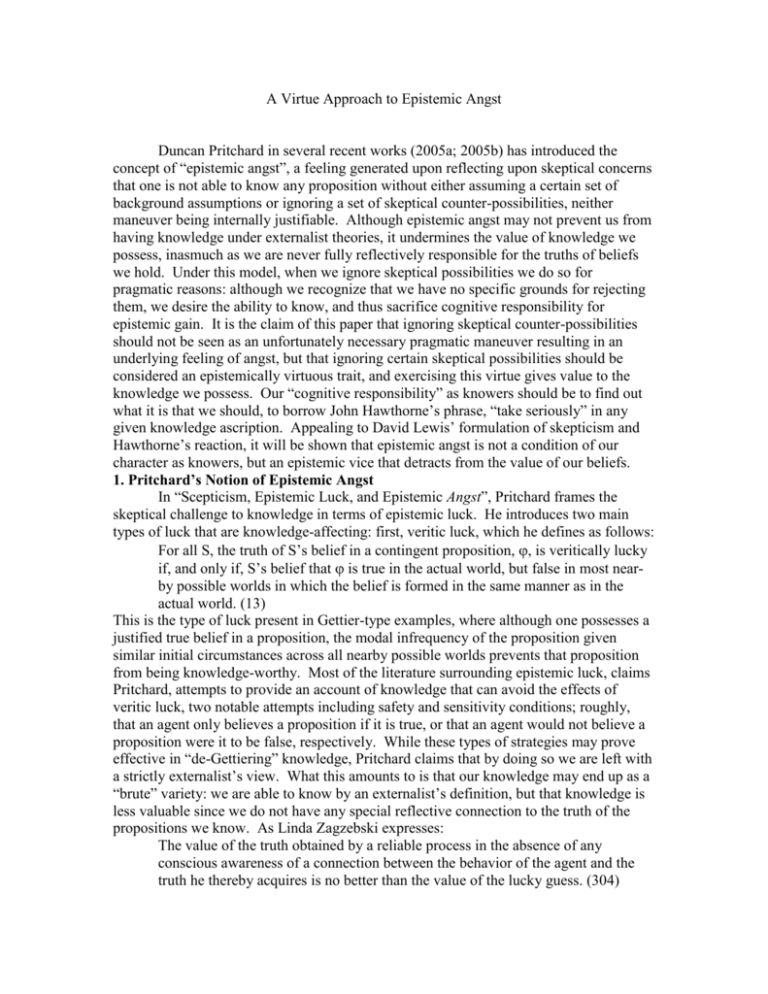
A Virtue Approach to Epistemic Angst Duncan Pritchard in several recent works (2005a; 2005b) has introduced the concept of “epistemic angst”, a feeling generated upon reflecting upon skeptical concerns that one is not able to know any proposition without either assuming a certain set of background assumptions or ignoring a set of skeptical counter-possibilities, neither maneuver being internally justifiable. Although epistemic angst may not prevent us from having knowledge under externalist theories, it undermines the value of knowledge we possess, inasmuch as we are never fully reflectively responsible for the truths of beliefs we hold. Under this model, when we ignore skeptical possibilities we do so for pragmatic reasons: although we recognize that we have no specific grounds for rejecting them, we desire the ability to know, and thus sacrifice cognitive responsibility for epistemic gain. It is the claim of this paper that ignoring skeptical counter-possibilities should not be seen as an unfortunately necessary pragmatic maneuver resulting in an underlying feeling of angst, but that ignoring certain skeptical possibilities should be considered an epistemically virtuous trait, and exercising this virtue gives value to the knowledge we possess. Our “cognitive responsibility” as knowers should be to find out what it is that we should, to borrow John Hawthorne’s phrase, “take seriously” in any given knowledge ascription. Appealing to David Lewis’ formulation of skepticism and Hawthorne’s reaction, it will be shown that epistemic angst is not a condition of our character as knowers, but an epistemic vice that detracts from the value of our beliefs. 1. Pritchard’s Notion of Epistemic Angst In “Scepticism, Epistemic Luck, and Epistemic Angst”, Pritchard frames the skeptical challenge to knowledge in terms of epistemic luck. He introduces two main types of luck that are knowledge-affecting: first, veritic luck, which he defines as follows: For all S, the truth of S’s belief in a contingent proposition, , is veritically lucky if, and only if, S’s belief that is true in the actual world, but false in most nearby possible worlds in which the belief is formed in the same manner as in the actual world. (13) This is the type of luck present in Gettier-type examples, where although one possesses a justified true belief in a proposition, the modal infrequency of the proposition given similar initial circumstances across all nearby possible worlds prevents that proposition from being knowledge-worthy. Most of the literature surrounding epistemic luck, claims Pritchard, attempts to provide an account of knowledge that can avoid the effects of veritic luck, two notable attempts including safety and sensitivity conditions; roughly, that an agent only believes a proposition if it is true, or that an agent would not believe a proposition were it to be false, respectively. While these types of strategies may prove effective in “de-Gettiering” knowledge, Pritchard claims that by doing so we are left with a strictly externalist’s view. What this amounts to is that our knowledge may end up as a “brute” variety: we are able to know by an externalist’s definition, but that knowledge is less valuable since we do not have any special reflective connection to the truth of the propositions we know. As Linda Zagzebski expresses: The value of the truth obtained by a reliable process in the absence of any conscious awareness of a connection between the behavior of the agent and the truth he thereby acquires is no better than the value of the lucky guess. (304) Thus, for Pritchard and Zagzebski what is up for debate in an externalist’s treatment of epistemic luck is not the definition of knowledge per se, but the value of knowledge that is acquired. If the knowledge we receive from theories invoking safety or sensitivity conditions is “no better than a lucky guess”, then externalist treatments successfully diffuse only one aspect of the harmfulness of epistemic luck. Pritchard attempts to capture these further value-harmful effects of luck in his second definition, “reflective epistemic luck”: For all S, the truth of S’s belief is a contingent proposition, , is reflectively if, and only if, S’s belief that is true in the actual world, but, given only what S is able to know by reflection alone, false in most near-by possible worlds in which the belief is formed in the same manner as in the actual world. (15) Pritchard does not commit himself to claiming that the reflective condition must be avoided in order to have a complete knowledge formula; rather, his claim is that knowledge that is devoid of both the veritic and reflective conditions is the type of knowledge that we are most interested in having. Knowledge of a proposition that is not tainted by reflective epistemic luck is valuable, or at least more valuable than that which only meets externalist criteria. Pritchard draws one more important connection: between skepticism and reflective epistemic luck. In essence, obtaining valuable knowledge by diffusing reflective epistemic luck is a lot more difficult than it appears prima facie, inasmuch as from an internal perspective, we do not have adequate grounds to dismiss skeptical challenges. While we might have adequate evidence to meet externalist criteria, our reasons do not, says Pritchard, “go, as it were, ‘right down’ to be reflectively accessible reasons for believing everything that is presupposed in one’s knowledge…whilst I might know [a] skeptical hypothesis to be false in some brute externalist sense…I do not know it in an internalistic sense that demands sufficient reflectively accessible grounds in favour of the belief in question” (19-20). Thus, we are creatures whose character innately possesses a degree of “epistemic angst”, a “general fear about the nature of our epistemic position” which is caused by “the discovery, in the context of reflection, that the ultimate scope of our cognitive responsibility is severely restricted” (21). Pritchard’s portrait of knowing agents is one of pragmatic necessity: in order to know at all we must commit ourselves to reflectively inaccessible externalist grounds, but the quality of our knowledge will be inescapably tainted as a result. Pritchard’s prognosis for knowledge feels grimmer than he most likely intended it to be: the skeptic has won a victory, perhaps not for the existence of knowledge simpliciter, but over the quality of knowledge we are able to possess. However, while a central motivating factor in the fight against traditional skepticism is that the conclusion that we know very little is strongly counter-intuitive, it seems equally unlikely that we do not possess any truly valuable knowledge. Thus, we should be hesitant in granting the skeptic even this victory, even if Pritchard is correct in classifying knowers as essentially skeptical beings. I will first look examine the type of skepticism that Pritchard is assuming, and then attempt to diffuse the problem of epistemic angst by looking at some of the responses to said skepticism. 2. Lewis’ Skepticism Pritchard seems to be assuming that a kind of Lewisian skepticism is at work in his formulation of angst, inasmuch as any skeptical counter-possibility we can conceive of is relevant to a given knowledge ascription. David Lewis, in his “Elusive Knowledge”, summarizes this idea in his “rule of attention”: No matter how far-fetched a certain possibility may be, no matter how properly we might have ignored it in some other context, if in this context we are not in fact ignoring it but attending to it, then for us now it is a relevant alternative…Let your fantasies rip. Find uneliminated possibilities of error everywhere. Now that you are attending to them…you have landed in a context with an enormously rich domain of potential counter-examples to ascriptions of knowledge (1996, 559). Although Lewis is examining the skeptical claim through the eyes of the contextualist, the force of the challenge is equally felt by the internalist. Reflective epistemic luck is likewise present if, according to the potential knower, uneliminated possibilities cannot be internally refuted: a modal reordering from the viewpoint of the agent will not necessarily relegate skeptical possibilities to far-off possible worlds as they may, as far as the agent can know, be nearby. Note that conscious reflection on skeptical possibilities is not a necessary component of reflective epistemic luck: the agent who is reflectively epistemically lucky about some proposition need not consciously consider potential skeptical defeaters in order for reflective luck to take effect1. Rather, the angst becomes present only upon reflection, when we consciously realize how much we are taking for granted in any given knowledge claim. Thus, Pritchard should not be read as holding an “ignorance is bliss” view of epistemology: while some agents may not ever reflect upon their statuses qua epistemological beings, this lack of attention does not save them from the value-harmful effects of reflective epistemic luck (although they may never themselves feel “angsty”). Under some internalist theories, reflective uncertainty is enough to prevent a belief from being knowledge-worthy: an agent’s skeptical concerns have the ultimate “veto power” when it comes to knowledge. The same effects are present in epistemic angst, although this is a type of “value veto power.” But while Pritchard seems to be at least empirically correct when he claims that agent’s often experience epistemic angst, he does not make a claim as to whether such a feeling is prudent in any sense, or if it should be ignored. It is my contention that the latter is the most epistemically responsible maneuver, not simply because of pragmatic reasons that allow agents to know at all, because ignoring certain skeptical possibilities should be seen as epistemically virtuous, and this virtuous character adds value to our knowledge. I begin with a critique of Lewis’ “rule of attention” by John Hawthorne: I think the real trouble here is the notion of attention. Entertaining or attending to a state of affairs is one thing. Taking seriously the ideas that things may actually be that way is quite another. I go to the movies and see The Matrix…I can watch the movie without taking seriously the idea that I am a pod person…By making salience too cheap, Lewis makes the relevance of skeptical possibilities too easy (64). Since according to Lewis’ view of skepticism any degree of attention to a possibility makes that possibility a potential defeater in a belief formation, a simple mention of a BIV scenario, say, requires the agent to defeat that possibility in order to internally know Indeed the agent is often quite unaware. Pritchard uses the example of the “naïve chicken-sexer”, who is reliably able to distinguish between the sexes of chicks but has no conscious awareness, or has a flawed idea of how he is able to perform his task so well. 1 propositions reliant upon that possibility (say, that the agent has two hands). Pritchard’s contention is, of course, that such possibilities often cannot be defeated, and as a result we lose internal justification (although it may still be possessed in an externalist’s sense). Hawthorne’s response, however, points to a potential escape from the skeptical challenge: it seems unwise to let our epistemic character be so easily swayed by seemingly modally distance possibilities, and thus while we can certainly “attend” to them in some way, we need not “take them seriously”, meaning that we are not required to consider those possibilities salient when forming our beliefs. Indeed, it seems that if an agent were to take BIV possibilities seriously, i.e. would withhold beliefs because she was unable to eliminate the possibility, our first reaction would most likely be to tell that agent so “snap out of it”, at least in the casual setting of the movie theatre. While Hawthorne certainly speaks to an intuitive reaction, we are still without an adequate response to epistemic angst: telling an agent to “come to their senses” because they are considering salient modally distant possibilities could be interpreted as precisely the kind of pragmatic maneuver Pritchard is describing as a response to feelings of epistemic angst. The Virtue of Taking Things Seriously Zagzebski was previously quoted expressing a concern for the value of knowledge under an externalist’s reading. Her own interpretation of how knowledge acquires value is through the exercise of an agent’s virtuous epistemic character, traits that either lead one toward the truth, away from falsehood, or both. Contemporary virtue epistemologists have created diverse lists of intellectual virtues; some include, for example, open and fair-mindedness, curiosity, impartiality, conscientiousness, perseverance, excellence of natural and cognitive faculties, and intellectual analogues of traditional moral virtues, such as courage and humility (Sherman and White, 38). Thus, knowledge-worthy beliefs formed in ways that exercise many of these virtues are typically considered more valuable than those which do not, or which exercise very few. Pritchard’s conception of angst Lewis’ Skepticism Hawthorne’s reaction The differences between “attending to” and “taking seriously” Ignoring as a virtue – Zagzebski and the value of the motive adding to the value of the act: if we are motivated by a search or love for the truth and not simply knowing as a pragmatic end, then our knowledge gains that value. Thus, angst is vicious because it speaks of the wrong epistemic motives. 6. Kornblith’s mention of those experiments, with the heuristic biases 1. 2. 3. 4. 5. Works Cited Sherman, Nancy and Heath White. “Intellectual Virtue: Emotions, Luck, and the Ancients.” In Intellectual Virtue. Zagzebski, Linda and Michael DePaul.

